Part of the series Representing African Film: Criteria for African film selection at Dutch film festivals.
Before we can understand how film festival represent African film in the Netherlands, we must first understand what African film constitutes. How did film develop in Africa? What have been filmmakers' motivations? How is African film understood today? And, importantly, what is the role of film festivals herein?
Filming Africa
Excerpts from Zohra, produced by the Tunisian Albert Samama. Released in 1922, Zohra is considered one of the first African films (Harrow, 2017). It tells the story of a shipwrecked French woman who resides with an indigenous North African community. Eventually she is repatriated by a Frenchman.
An example of a colonial African film. Here is the Gold Coast, was released in 1947 by the British Central Office of Information. The film details and justifies the colonial development program for the Gold Coast (present day Ghana). Source
Film was introduced in Africa by the Lumière brothers in 1896. The medium was quickly adopted to serve the colonial enterprise to supposedly educate Africans into civilised and obedient subjects. Simultaneously it served to entertain and inform settlers and metropole audiences (Thackway, 2014; Harrow, 2017). Didactic films would remain a trend in African cinema. After independence, one-party states still employed film to advocate their causes and promote nationalist sentiments. Filmmakers’ “political commitment was based on the perception that cinema, like literature, must be a tool for social transformation" (Tcheuyap, 2018, p. 202). Independently, filmmakers were preoccupied with constructing their own image of Africa, restoring African cultural pride along the way (Thackway, 2014). Interestingly, such movies did not always appeal to African audiences, who like audiences elsewhere, sought entertainment rather than pedagogy (Tcheuyap, 2018).
Trailer for Afrique Sur Seine (1955). Although set and shot in Paris, the movie was among the first made by an African production team, including director Paulin Soumanou Vierya (Harrow, 2017). The film follows African students in the French capital.
Popular African cinema emerged in the late eighties in West Africa (Dovey, 2015). Filmmakers slowly moved away from nationalist political engagement and purely ‘African stories’. Entertaining movies with universal themes were able to attract larger African audiences (Tcheuyap, 2018). Pioneer of this new approach, Idrissa Ouedraogo, noted the need to move beyond the idea of African cinema. To him, a film should be the director’s authentic work, and not determined by a set of rules that supposedly make it African (Tcheuyap, 2018).
Places like Nollywood now produce ‘purely entertaining’ content at unprecedented scales. While some deem popular African cinema a qualitative downgrade, others counter that argument as elitist (Dovey, 2013). The two trailers shown below, Nimbe (2019) and The Big Fat Lie (2020), give a clue as to the diversity existing within Nollywood alone.
The political aspect of filmmaking has not been completely abandoned. Take for example the Ethiopian-American director Rasselas Lakew. Answering whether or not he considered himself an African filmmaker, he replied in the affirmative adding that “Perhaps I am not a filmmaker at all but a politician” (as quoted in Dovey, 2013, p. 109). Lakew also alluded to a new higher cause for African film: countering afro-pessimism through positive images of the continent. Within the Ethiopian context, he argued, this is the only thing audiences want to see (Dovey, 2013). Thackway (2014) observed a similar desire or need to represent African people truthfully, among African francophone filmmakers, stationed in Europe. While abandoning the stylised nationalism of early post-independence filmmaking, these directors still pursue a politically and socially critical essence. Rather than a directly didactic approach, this new generation encourages (African) audiences to be reflective.
In The Athlete (2009), Rasselas Lakew tried to present a positive film about Africa, through celebrating the famous Ethiopian marathon runner Abebe Bikila (Dovey, 2010).
Baamum Nafi, set to be released in 2021, was one of the films shown at the Leiden International Film Festival, 2021. According to curator Elvire Eijkman, the film contains a strong element of sociopolitical critique. Importantly, this is only one aspect of the film, which can be seen more as a warning then an attempt at educating audiences (personal communication, November 16, 2020).
Screening Africa
Film festivals have grown to be of fundamental importance to film development. They connect producers, buyers and audiences. They offer cash prizes that can cover some of the immense costs of film production. Over the years, film festivals have also become the principal platform for film critique, and thus where films and their makers ‘make or break’ (Africanus Aveh, 2020; Dovey, 2015).
Moussa Sene Absa, a filmmaker from Senegal, told Dovey (2015) that African film would not exist without film festivals. She interpreted this statement as pertaining to a specific type of African film, which led her to wonder which type of films were shown at festivals and which were excluded.
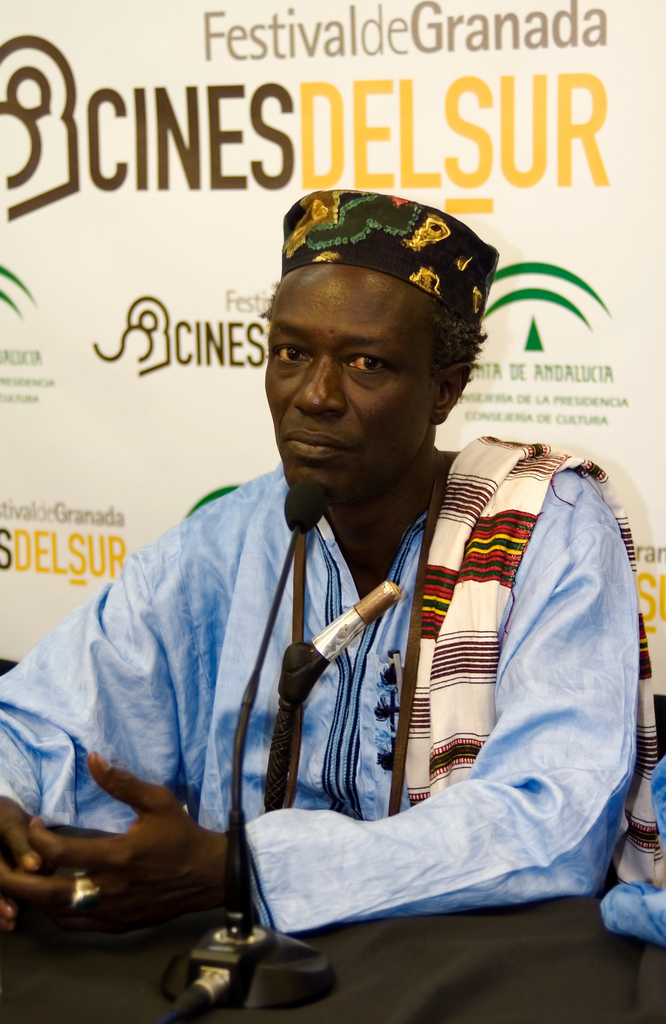
Moussa Sene Absa at 2007 Cines de Sur festival
Within Africa, film festivals showcasing African films have existed as early as the 1960s. International film festivals in Africa and African film festivals outside of the continent followed the next decade. Only in the late nineties did the trend emerge among international film festivals outside Africa to dedicate programs to African film (Dovey, 2015). Presently, prominent festivals on the continent are plagued by security issues. As a consequence, African filmmakers have set their gaze upon the international festivals in cities like Cannes and Tokyo. According to Africanus Aveh (2020) this is a worrisome development for African cinema, as it creates distance between African filmmakers and African audiences. The trend corresponds with the great number of high-profile African filmmakers choosing to reside outside of the continents while still using Africa as the scenery (Thackway, 2014).
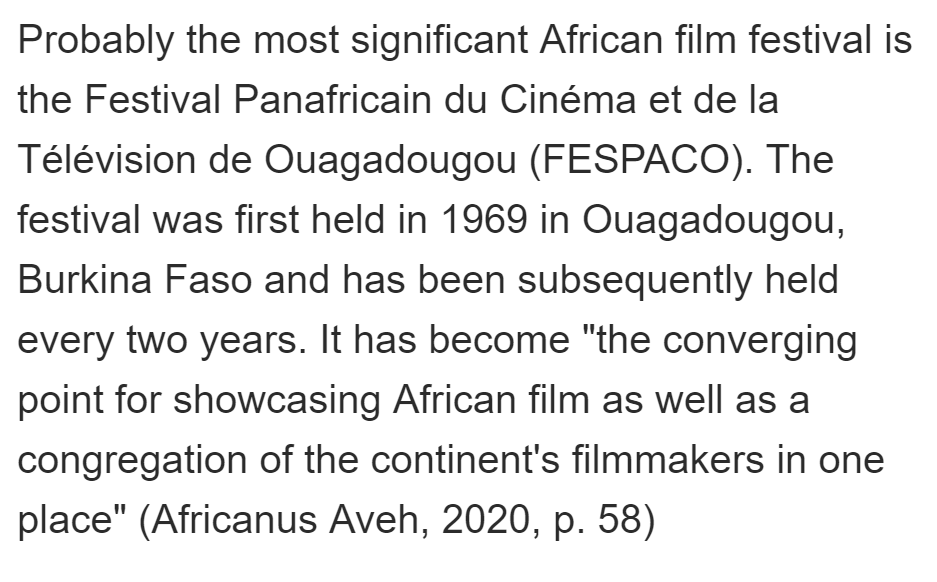
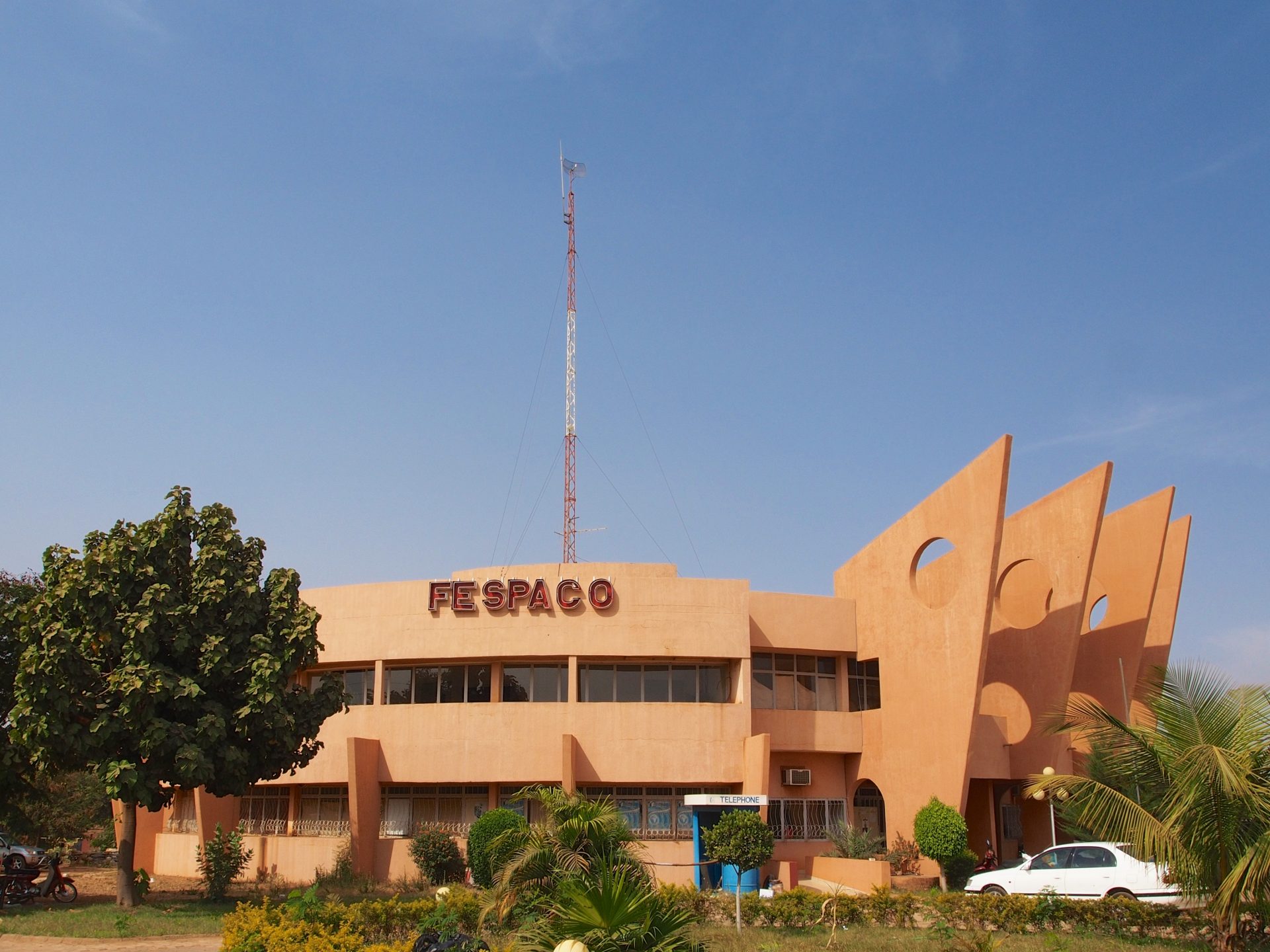
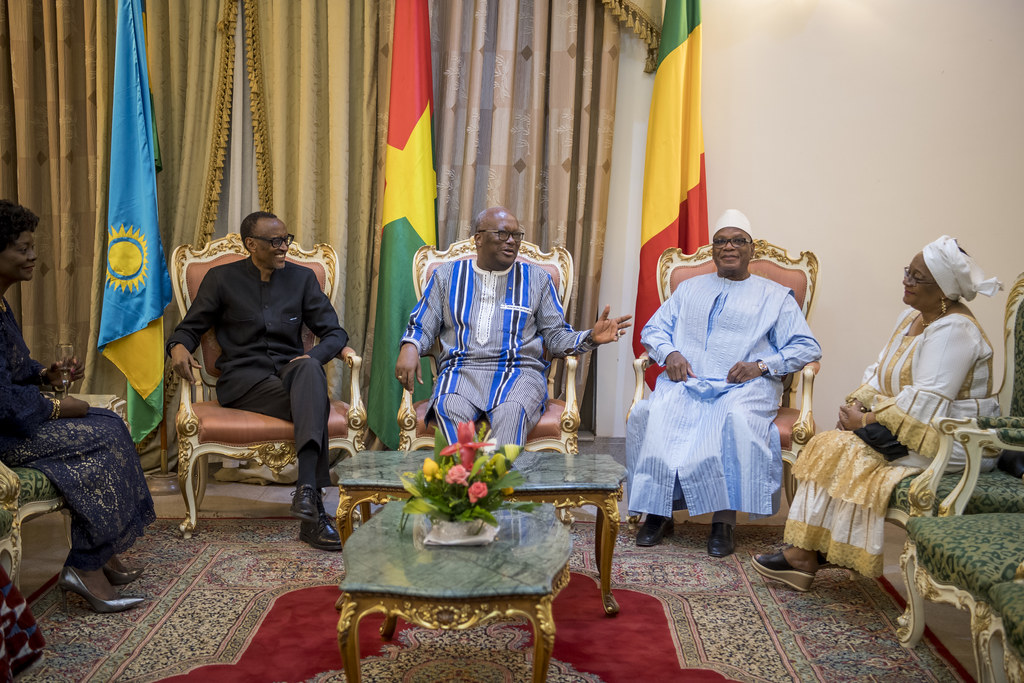
Whether the African film in question is political or not, film festivals are essentially so. In compiling programmes, shortlists, flyers, etc. choices are made on which films to include and exclude (Barlet, Farell & Gomis, 2020; Dovey, 2015). Due to the heterogeneity of African film, it is unlikely that a curator could ever succeed at composing a truly representative program of African films. Moreover, the selection of films is often strongly linked to the identity of the curator (Atkinson, 2017).
Oftentimes the films selected for festivals are still those with didactic content or claims to true representation of Africanity (Barlet, Farell & Gomis, 2020; Dovey, 2015). Furthermore, curators, often White women, tend to select movies of the arthouse genre which generally appeal to White audiences. Atkinson (2017) found that African diaspora audiences were similarly interested in such arthouse movies, but also craved for popular cinema such as Nollywood and Arabic films.
“To presume that every African writer is a closeted social scientist betrays a fundamental disrespect for those writers’ artistry” - T. Selasi, 2013, p. 8
So what is African film? Let us first consider what it means to call it ‘African’. This is an ongoing discussion in the field of literary studies. Taiye Selasi (2013) convincingly argued that African literature does not exist. The descriptive ‘African’ is as void content-wise as would be ‘European’. Yet, its use is sustained by manifold assumptions that group diverse works and their authors under one category. One of these, as pointed out by Selasi, is that writers with African origins are sociologists in disguise. Their work, alongside that of other artistic practitioners, is first-most a parable for, critique upon, or dissertation about African society (whatever that may then be). Only after this, if at all, is the story seen as a story, the art as purely art. Can film festivals do justice to African film as works of art? Or do they also present them as academic or ideological works?
“Any attempt to present African cinema as a unified body of films will immediately run into the same objection to any singular notion of African culture, be it literature, music, or art.” - K. W. Harrow, 2017, p. ix
What does it mean when a festival speaks of African film? Selasi showed us that the descriptive 'Africa' is void of meaning. Others, like Harrow, note the impossibility of referring to such a vast variety of film cultures as one big 'African cinema'. Similarly, Dovey (2015) stated that “there have been, and continue to be, many trends and traditions in filmmaking across the continent and in African diasporas, making it impossible to distinguish any particular coherence to the category of African filmmaking” (p. 126). Accurately presenting African film is starting to look like an impossible endeavour...
“Despite the obvious cultural heterogeneity of so vast a geographic area, many peoples of the region indeed share an understanding of the arts as an integral part of the community’s daily life, in which they often play a socio-educational role.” - M. Thackway, 2014, p. 8
Is the category African film problematic then? Or would it be worse not to acknowledge specific characteristics of African cinema and lump it together with global cinema (Dovey, 2015)? Atkinson (2017) found that film festivals approaching African film as art “on par with with world cinema from anywhere else in the world” may limit the audiences they can persuade, thereby limiting the reach of African cinema in general (p.696). Some also see naturally uniting elements across films made in Africa. Thackway (2014) argues that the persistent ubiquity of the representative/restorative theme among African cinema, at least francophone, makes it a distinct and coherent category despite the internal heterogeneity. 'African film' can thus be both a box and a podium. Ideally, for film festivals the category should serve as the latter.
References
Africanus Aveh, M. (2020). FESPACO -- Promoting African Film Development and Scholarship. Journal of Film and Video, 72(1-2), 58-66.
Atkinson, J. (2017). Curating an African Film Festival in Scotland. Third Text, 31(5-6), 681-968. https://doi.org/10.1080/09528822.2018.1433115
Barlet, O., Farell, C., & Gomis, A. (2020). Privileging Other Writings: Interview with Alain Gomis at the Carthage Film Festival 2019, Tunis. Black Camera, 11(2), 216-221. https://www.jstor.org/stable/10.2979/blackcamera.11.2.10
Dovey, L. (2015). Through the Eye of a Film Festival: Toward a Curatorial and Spectator-Centered Approach to the Study of African Screen Media. Cinema Journal, 54(2), 126-132. https://www.jstor.org/stable/43653096
Dovey, L. (2013). Interview with Rasselas Lakew: ‘Tarifa African Film Festival’, May 2010. Journal of African Cultural Studies, 25(1), 107-113. https://doi.org/10.1080/13696815.2013.767189
Harrow, K. W. (2017) African Filmaking: Five Formations. Michigan State University Press. http://web.a.ebscohost.com.ezproxy.leidenuniv.nl:2048/ehost/detail/detail?nobk=y&vid=1&sid=0e0ed165-8d93-4815-b258-451ded9088cc@sdc-v-sessmgr02&bdata=JnNpdGU9ZWhvc3QtbGl2ZQ==#AN=1544984&db=e000xww
Selasi, T. (2014, September 4) African Literature Doesn’t Exist [Opening Speech]. International Literature Festival, Berlin Germany. https://www.literaturfestival.com/medien/texte/eroeffnungsreden/Openingspeach2013_English.pdf
Tackway, M. (2014). Exile and the “Burden of Representation”: Trends in Contemporary Sub-Saharan Francophone African Filmmaking. Black Camera, 5(2), 5-20. https://www.jstor.org/stable/10.2979/blackcamera.5.2.5
Tcheuyap, A. (2018). Against the “One Cinema System” Idrissa Ouedraogo and the Invention of Contemporary African Films. African Studies Review, 61(3), 201-206. https://doi.org/10.1017/asr.2018.75
Further Readings
Dovey, L. (2010). African Film and Video: Pleasure, Politics, Performance. Taylor & Francis.
Dovey, L. (2015). Curating Africa in the Age of Film Festivals. Palgrave Macmillan.
Kredell, B. (2016). Film Festivals: History, Theory, Method, Practice. Routledge.
Krings, M. & Okome, O. (2013). Global Nollywood: The Transnational Dimensions of an African Video Film Industry. Indiana University Press.
Kyalo, M. (1983/84). Resolving the Cultural Dilemma of the African Film. Ufahamu: Journal of the African Activist Association, 13(1), 134-146.
Malkmus, L. & Armes, R. (1991). Arab and African Film Making. Zed Books.
Further Watchings
The Youtube Channel of the African Film Festival, Inc, from New York City, hosts several trailers, interviews with African filmmakers, and other informative videos.
A short documentary on the series Matamata and Pilipili. This series, likened to Laurel and Hardy, used comic scenes to teach socially desirable behaviour. It is set in Belgian Congo, most likely in the 1930s (Harrow, 2017).
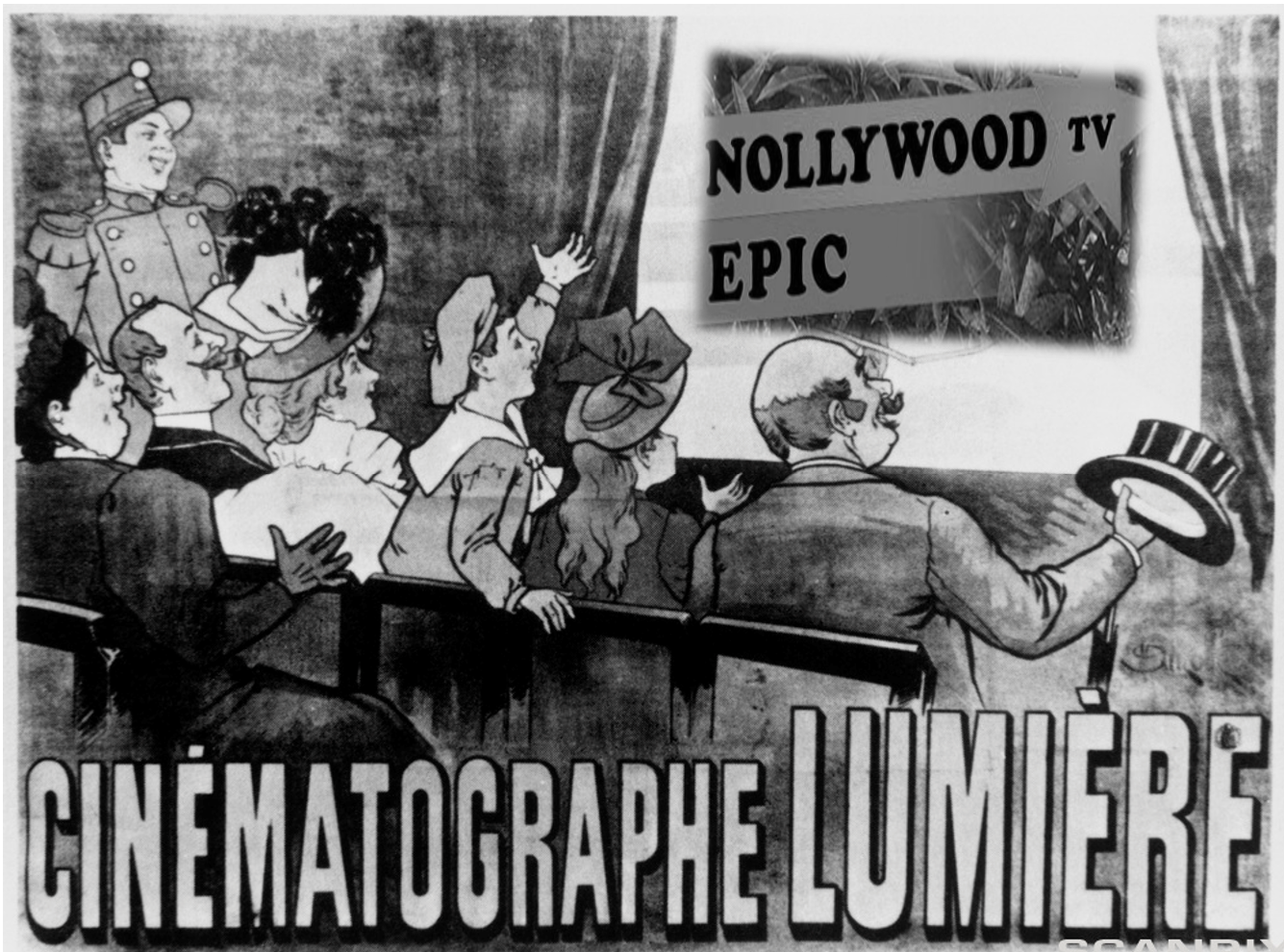
All images in this blog are lisenced as creative commons.

